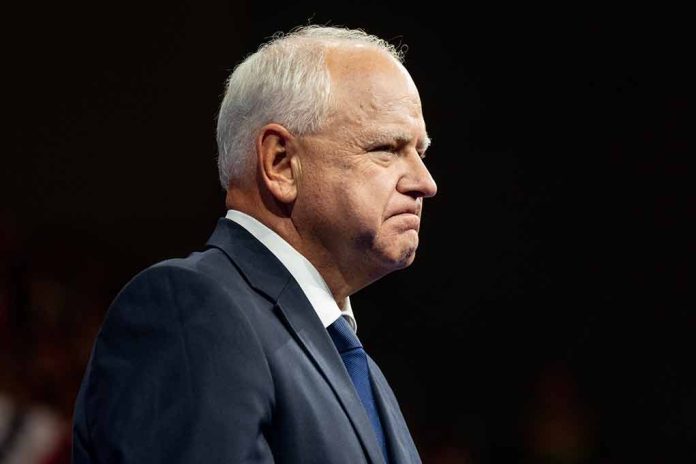
Minnesota Governor Tim Walz defends his economic policies, sparking controversy with his “moral capitalism” stance.
At a Glance
- Walz clarifies his “moral capitalism” approach, distinguishing it from socialism
- The governor defends public investments in infrastructure and education
- Walz and Harris support a billionaire tax to promote economic fairness
- Critics label Walz’s policies as “tax-and-spend” and socialist
Walz Defends Economic Stance Amid Criticism
Minnesota Governor Tim Walz, running alongside Vice President Kamala Harris, has found himself at the center of a heated debate over his economic policies. Walz recently appeared on Fox News to address concerns about his approach, which he calls “moral capitalism.” This stance has drawn criticism from conservatives who argue that his policies lean towards socialism.
Walz, known for his diverse background as a congressman, high school teacher, union member, and Army National Guard command sergeant major, has implemented a series of progressive policies in Minnesota. These include a state child tax credit, free school meals for K-12 students, and expanded paid family and medical leave.
Minnesota Gov. Tim Walz, a top VP contender for Kamala Harris, says socialism is actually just "neighborliness." pic.twitter.com/xISVQSxIUv
— Alpha News (@AlphaNewsMN) July 30, 2024
“Moral Capitalism” vs. Socialism
In defending his economic philosophy, Walz has attempted to draw a clear distinction between his “moral capitalism” and socialism. He argues that his approach maintains core capitalist principles while ensuring fairness and collective benefit for society.
“One person’s socialism is another person’s neighborliness.” – Tim Walz
This statement has been met with skepticism from Republican lawmakers. Senator Mike Lee of Utah went as far as to call the Harris-Walz ticket “the most radical ticket in American history.” Walz counters that the term “socialism” is often used by the right to criticize collective societal efforts that he believes are beneficial.
Progressive Policies in Minnesota
As governor, Walz has implemented a range of progressive economic policies. He reformed Minnesota’s tax system to be more progressive, cutting taxes for low and middle-income residents while increasing taxes on higher earners. Walz also invested significantly in infrastructure and housing, including a billion-dollar housing investment bill.
In support of organized labor, Walz abolished noncompete agreements, enhanced worker protections, and established a minimum wage for rideshare drivers. He also signed legislation for transparent ticket pricing and legalized marijuana in Minnesota.
Billionaire Tax and Economic Fairness
Walz and Harris have vocally supported a billionaire tax to promote economic fairness. This aligns with their goal of balancing wealth accumulation with middle-class prosperity. During a New Hampshire rally, Harris emphasized the importance of fair taxation for the wealthy.
“Billionaires and big corporations must pay their fair share in taxes,” she said. “It’s just not right that those who can most afford it are often paying a lower tax rate than our teachers and our nurses and our firefighters.”
Critics, particularly conservatives, have labeled Walz’s economic policies as “tax-and-spend” and socialist, despite his insistence on maintaining capitalist principles. The debate surrounding Walz’s economic approach highlights the ongoing tension between progressive policies and traditional capitalist values in American politics.
As the political landscape continues to evolve, Walz’s “moral capitalism” stance and its implementation in Minnesota may serve as a litmus test for similar policies on a national scale. The success or failure of these initiatives could significantly impact the direction of economic policy in the coming years.
Sources:
- Walz defends using the term ‘socialism’: ‘It’s what the right uses’
- Tim Walz’s Response to ‘Socialism’ Criticism Takes Off Online
- Socialism Is Not Neighborly
- The Economic Mind of Tim Walz
- Comparing Free Enterprise and Socialism
- Standing against racial capitalism: Reconsidering psychology’s role in dismantling systemic racism.














